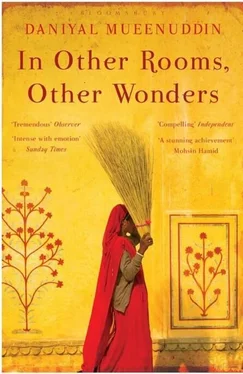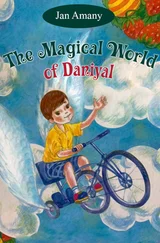Daniyal Mueenuddin
In Other Rooms, Other Wonders
Three things for which we kill –
Land, women and gold.
— Punjabi proverb
HE FLOURISHED ON on a signature capability, a technique for cheating the electric company by slowing down the revolutions of electric meters, so cunningly done that his customers could specify to the hundred-rupee note the desired monthly savings. In this Pakistani desert, behind Multan, where the tube wells ran day and night, Nawab’s discovery eclipsed the philosopher’s stone. Some thought he used magnets, others said heavy oil or porcelain chips or a substance he found in beehives. Skeptics reported that he had a deal with the meter men. In any case, this trick guaranteed his employment, both off and on the farm of his patron, K. K. Harouni.
The farm lay strung along a narrow and pitted farm-to-market road, built in the 1970s when Harouni still had influence in the Lahore bureaucracy. Buff or saline-white desert dragged out between fields of sugarcane and cotton, mango orchards and clover and wheat, soaked daily by the tube wells that Nawabdin Electrician tended. Beginning the rounds on his itinerant mornings, summoned to a broken pump, Nawab and his bicycle bumped along, whippy antennas and plastic flowers swaying. His tools, notably a three-pound ball-and-peen hammer, clanked in a greasy leather bag that hung from the handlebars. The farmhands and the responsible manager waited in the cool of the banyans, planted years ago to shade each of the tube wells. ‘No tea, no tea,’ he insisted, waving away the steaming cup.
Hammer dangling like a savage’s axe, Nawab entered the oily room housing the pump and electric motor. Silence. He settled on his haunches. The men crowded the door, until he shouted that he must have light. He approached the offending object warily but with his temper rising, circled it, pushed it about a bit, began to take liberties with it, settled in with it, drank tea next to it, and finally began disassembling it. With his screwdriver, blunt and long, lever enough to pry up flagstones, he cracked the shields hiding the machine’s penetralia. A screw popped and flew into the shadows. He took the ball-and-peen and delivered a cunning blow. The intervention failed. Pondering, he ordered one of the farmworkers to find a really thick piece of leather and to collect sticky mango sap from a nearby tree. So it went, all day, into the afternoon, Nawab trying one thing and then another, heating the pipes, cooling them, joining wires together, circumventing switches and fuses. And yet somehow, in fulfillment of his genius for crude improvisation, the pumps continued to run.
Unfortunately or fortunately, Nawab had married early in life a sweet woman, whom he adored, but of unsurpassed fertility; and she proceeded to bear him children spaced, if not less than nine months apart, then not that much more. And all daughters, one after another after another, until finally came the looked-for son, leaving Nawab with a complete set of twelve girls, ranging from infant to age eleven, and then one odd piece. If he had been governor of the Punjab, their dowries would have beggared him. For an electrician and mechanic, no matter how light-fingered, there seemed no question of marrying them all off. No moneylender in his right mind would, at any rate of interest whatsoever, advance a sufficient sum to buy the necessary items: for each daughter, beds, a dresser, trunks, electric fans, dishes, six suits of clothes for the groom, six for the bride, perhaps a television, and on and on and on.
Another man might have thrown up his hands — but not Nawabdin. The daughters acted as a spur to his genius, and he looked with satisfaction in the mirror each morning at the face of a warrior going out to do battle. Nawab of course knew that he must proliferate his sources of revenue — the salary he received from K. K. Harouni for tending the tube wells would not even begin to suffice. He set up a little one-room flour mill, run off a condemned electric motor — condemned by him. He tried his hand at fish-farming in a little pond at the edge of one of his master’s fields. He bought broken radios, fixed them, and resold them. He did not demur even when asked to fix watches, though that enterprise did spectacularly badly, and in fact earned him more kicks than kudos, for no watch he took apart ever kept time again.
K. K. Harouni rarely went to his farms, but lived mostly in Lahore. Whenever the old man visited, Nawab would place himself night and day at the door leading from the servants’ sitting area into the walled grove of ancient banyan trees where the old farmhouse stood. Grizzled, his peculiar aviator glasses bent and smudged, Nawab tended the household machinery, the air conditioners, water heaters, refrigerators, and water pumps, like an engineer tending the boilers on a foundering steamer in an Atlantic gale. By his superhuman efforts he almost managed to maintain K. K. Harouni in the same mechanical cocoon, cooled and bathed and lighted and fed, that the landowner enjoyed in Lahore.
Harouni of course became familiar with this ubiquitous man, who not only accompanied him on his tours of inspection, but morning and night could be found standing on the master bed rewiring the light fixture or in the bathroom poking at the water heater. Finally, one evening at teatime, gauging the psychological moment, Nawab asked if he might say a word. The landowner, who was cheerfully filing his nails in front of a crackling rosewood fire, told him to go ahead.
‘Sir, as you know, your lands stretch from here to the Indus, and on these lands are fully seventeen tube wells, and to tend these seventeen tube wells there is but one man, me, your servant. In your service I have earned these gray hairs’ — here he bowed his head to show the gray — ‘and now I cannot fulfill my duties as I should. Enough, sir, enough. I beg you, forgive me my weakness. Better a darkened house and proud hunger within than disgrace in the light of day. Release me, I ask you, I beg you.’
The old man, well accustomed to these sorts of speeches, though not usually this florid, filed away at his nails and waited for the breeze to stop.
‘What’s the matter, Nawabdin?’
‘Matter, sir? O what could be the matter in your service. I’ve eaten your salt for all my years. But sir, on the bicycle now, with my old legs, and with the many injuries I’ve received when heavy machinery fell on me — I cannot any longer bicycle about like a bridegroom from farm to farm, as I could when I first had the good fortune to enter your employment. I beg you, sir, let me go.’
‘And what’s the solution?’ asked Harouni, seeing that they had come to the crux. He didn’t particularly care one way or the other, except that it touched on his comfort — a matter of great interest to him.
‘Well, sir, if I had a motorcycle, then I could somehow limp along, at least until I train up some younger man.’
The crops that year had been good, Harouni felt expansive in front of the fire, and so, much to the disgust of the farm managers, Nawab received a brand-new motorcycle, a Honda 70. He even managed to extract an allowance for gasoline.
The motorcycle increased his status, gave him weight, so that people began calling him ‘Uncle,’ and asking his opinion on world affairs, about which he knew absolutely nothing. He could now range further, doing a much wider business. Best of all, now he could spend every night with his wife, who had begged to live not on the farm but near her family in Firoza, where also they could educate at least the two eldest daughters. A long straight road ran from the canal headworks near Firoza all the way to the Indus, through the heart of the K. K. Harouni lands. The road ran on the bed of an old highway, built when these lands lay within a princely state. Some hundred and fifty years ago one of the princes had ridden that way, going to a wedding or a funeral in this remote district, felt hot, and ordered that rosewood trees be planted to shade the passersby. He forgot that he had given the order within a few hours, and in a few dozen years he in turn was forgotten, but these trees still stood, enormous now, some of them dead and looming without bark, white and leafless. Nawab would fly down this road on his new machine, with bags and cloths hanging from every knob and brace, so that the bike, when he hit a bump, seemed to be flapping numerous small vestigial wings; and with his grinning face, as he rolled up to whichever tube well needed servicing, with his ears almost blown off, he shone with the speed of his arrival.
Читать дальше












